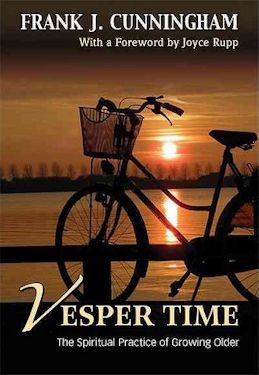
|
February 8, 2017
Book: Vesper Time: The Spiritual Practice of Growing Older Author: Frank J. Cunningham Orbis Books. Maryknoll, NY. 2017. Pp. 138
From a writer, editor, and publisher in his eight decade, Vesper Time addresses the yearning among elders for continued growth, expansiveness of heart, improvement of mind, and a meaningful understanding of their lives. As with Christianity's age-old practice of Vespers, or evening prayer, Frank Cunningham views it is a time of life when colors deepen and our experience of aging becomes our spiritual practice. With humor and wisdom, he looks at five facets of this integral spirituality --- memory, intimacy, diminishment, gratitude, and acceptance --- offering guidance and encouragement for those who are on this stage in their journey of life. An Excerpt from the Book: Memory Life must be lived forward but can only be understood backwards --- Soren Kierkegaard Vesper time is my future arrived. It's the present moment, a present moment formed by my past. As a spiritual practice, aging is about living into our memories, about seeking their meaning, about accepting and being kind to them. We do this through story, determining how our story shapes us, and by understanding that we are more than the sum of our experiences. Our story is not just a fact-based recall of events, accomplishments, failures, growth, or diminishment. It is also about recognizing an arc of nourishment, a leading theme that fed the multiple phases of our past, a storyline that fostered our growth and now helps us understand who we are. Theologian Leonard Baillas tells "The supreme achievement of the self is to find an insight that connects together the events, dreams, and relationships that make up our existence." Searching for that insight, that storyline, is an exercise in critical self-reflection. Like most spiritual practices, the discovery of what writer Thomas Merton calls the true self is a risky task. But without it we have no satisfying narrative. Without it we scuttle the chance to explain ourselves to ourselves, to discover what Merton describes as the person we can and should be emerging from the person we are. At the same time, we need to acknowledge that memories are shape shifters. They are yesterday's snows. They fade, melt, and change their constitution, yet remain to be found in another form. Vesper time is the time for such remembrance. --- Doesn't age allow us to see more clearly? We're no longer battered by the flotsam and jetsam of our journey in the world. Not that we've surpassed all problems. That's hardly the case as we deal with our diminishment. But we face less demand to "keep up" with a world that morphs and reshapes itself in continually compressed cycles of time. --- Remembrance is an entitlement of aging. In a very real sense we don't have to worry so much about where we're going, so we can and often do think about where we've been. Our experience has earned us a kind of healthy skepticism about our world and its ever-renewing problems and threats. --- We've divorced the world of work and even may have allowed ourselves to abandon the curse of busyness. We have more freedom and flexibility. We can find self-worth in something other than productivity once we put our hard-won identity of careers and relationships in perspective. A perspective that acknowledges that what we did, for better or worse, was important then. But that was then. Life has become the present moment. --- It provides time to explore our own spirituality. The rush of life worked against this. Work and family, surviving or thriving in the present while preparing for the future, often leaves us feeling adrift, unable to think about our interior lives. With so many distractions now removed, we can pay attention to what life has told us, what our relationships with loved ones tell us, what our hearts tell us. Table of Contents: 1. Memory 2. Intimacy 3. Diminishment 4. Gratitude 5. Acceptance |
|
